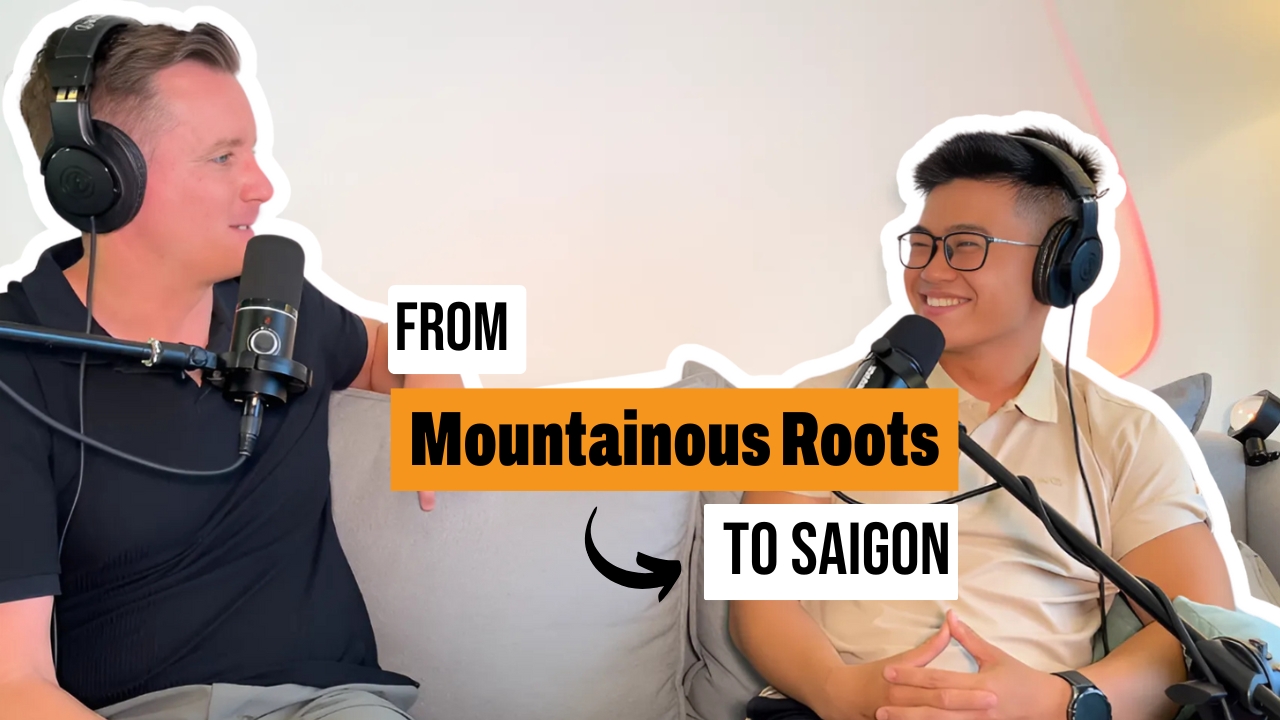In this blog post, I’m excited to introduce you to a special guest on A Vietnam Podcast. He is the youngest guest we’ve had on the show so far.
I am Niall Mackay, The Podcast Guy. I started my podcast 5 years ago as a hobby without knowing it would turn into my full-time job now. I helped other podcasters build and edit their show while making podcasts about stories and insights about Vietnam.
My guest today is my personal trainer, Thinh. As a member of Gen Z, Thinh brings a fresh perspective and unique stories about life in Vietnam, from growing up in the rural mountains of Dak Lak to making his way to the vibrant city of Saigon. In this episode, we talk about his journey, the challenges of breaking away from traditional career expectations, and his passion for fitness.
Childhood in Dak Lak
In the conversation, we talked about Thinh’s background and childhood, exploring his journey from a small farming community in Dak Lak to the bustling city of Saigon.
Thinh shared insights about his upbringing in Dak Lak, a mountainous region known for its coffee and pepper farming. Despite the beauty of the region, life there was tough, especially in terms of education.
The local schools were severely underdeveloped, with poor facilities like rocky grounds and makeshift bathrooms made of steel coils. The educational system was inadequate, particularly for long-term academic growth, and the region was home to many ethnic minorities, which added to the limited resources available.
Thinh explained that his parents worked long hours, juggling both farming and a transportation business, often leaving home early in the morning and returning late at night. Because of this, they decided to send him and his brother to Da Nang for better educational opportunities, where they could live under the care of their older sister, who was attending university.
At just eight years old, Thinh moved to Da Nang to live with his eldest sister, who took on the responsibility of caring for him and his brother while managing her own university studies. His sister handled tasks like cooking, helping with homework, and providing guidance that his parents couldn’t offer due to their busy schedules. Thinh was the first in his family to start learning English, which became a turning point in his life.
Thinh expressed deep love and gratitude for his sister, who played a crucial role in his upbringing. While their parents were busy working long hours to provide for the family, his sister took on responsibilities that went far beyond her age. She not only managed her own university studies but also took care of Thinh and his brother.
Although growing up in Dak Lak presented its challenges, Thinh was always proud of his family and the love that his parents, despite their demanding jobs, managed to foster within the household.
Moving to Danang – Learning English and Foreigners
When Thinh moved to Da Nang for the first time, it was a mix of excitement and nervousness. Before making the move, he asked his brother, who had already been living there for a few months, what it was like. His brother casually described it as “alright,” highlighting basic things like the beach, supermarkets, and local food treats like Bánh Tiêu (a fried pastry) and sausages, which seemed exciting to young Thinh.
At eight years old, everything in Da Nang felt new and fascinating to Thinh. The busy city, compared to his rural hometown of Dak Lak, was a completely different experience. On his first day, he felt energized by the new environment, exploring the city with childlike wonder.
However, as the day went on and the initial excitement wore off, homesickness set in. By the evening, the unfamiliarity of it all, from the TV shows to the surroundings, triggered a deep sense of loneliness. Thinh found himself missing his parents and his old life, crying as the feelings overwhelmed him, and calling his mother for comfort.
Despite these early challenges, the move to Da Nang marked a significant turning point in Thinh’s life. It was here that he would begin his education in English and eventually adapt to city life, creating new experiences and memories.
Learning English
Thinh began studying English when he was eight years old, shortly after moving to Da Nang. His parents were eager to find a good language center, enrolling him at VUS (Viet My), where he started speaking with foreigners at a young age. This early start proved to be one of Thinh’s biggest advantages. As a young child, he absorbed the new language quickly, as children often do, since their minds are like “a wide playing space” where everything they learn sticks. He also developed a passion for Western culture, particularly food and music, which helped maintain his interest in improving his English.
As he got older, Thinh continued to immerse himself in Western media, watching shows like The Late Late Show with James Corden and Jimmy Kimmel Live, as well as listening to popular podcasts like The Joe Rogan Experience. His strong foundation in English, built during his early years in Da Nang, enabled him to maintain fluency and develop excellent pronunciation.
English Teachers and Foreigners – Some Stereotypes
During the conversation, we touched on the topic of English teachers’ backgrounds, and how it seemed to hold particular importance to parents in Vietnam, especially in the past.
Thinh explained that there used to be a strong preference for native English-speaking teachers, particularly those who were white, which created a stereotype that any foreigner—especially from Western countries—could easily find work as an English teacher, regardless of qualifications. Many parents believed that simply having a native speaker, particularly a Western one, was a key factor in ensuring their children received the best education.
However, Thinh noted that in his personal experience, he was less concerned about where his teachers were from and more focused on the opportunity to speak with foreigners. He shared that many of his teachers were friendly and helpful, which left a lasting positive impression on him as a child. As long as he had the chance to practice English, Thinh didn’t care about his teachers’ nationalities or backgrounds. He valued the interaction and learning process more than anything else.
Besides, we touched on the stereotype of foreigners, particularly Westerners, being treated better or viewed more favorably simply because they are foreign. Thinh reflected that this may have been somewhat true years ago, with some Vietnamese people showing admiration for Westerners. However, he felt that this attitude has changed over time, and younger generations were more likely to see foreigners as just people from different backgrounds rather than something inherently superior.
Moving to Ho Chi Minh – Study and Career
Thinh is based in Saigon now, so I was curious about his journey. When I asked Thinh about moving to Saigon, he told me that the experience felt a lot like when he first moved to Da Nang from Dak Lak—it was all very new and exciting.
Being the youngest in his family and the only one who had moved to Saigon to live, study, and work, his parents were understandably worried. They often reminded him how innocent he was, with little to no life experience, and they half-expected him to lose his bike, get his phone snatched, or simply get overwhelmed by the big city.
Despite their worries, Thinh managed to adjust and thrive in Saigon. Moving to Saigon was a significant step for him, especially since his parents had always imagined he’d follow a more traditional path.
Like most parents in Vietnam, they hoped he’d become a doctor or an engineer—something stable and respected. But as we now know, Thinh chose a different direction. Even though they originally thought he worked as a translator for an interior design company (a clever story he crafted to appease them), the reality was that Thinh had found his passion as a personal trainer, working for himself.
When he finally told his parents the truth, the reaction wasn’t exactly what he’d hoped for. His sister, who had always taken care of him, wasn’t impressed with his decision to pursue fitness. She couldn’t understand why he would “waste” his university education and their parents’ financial support to become a personal trainer. To her, it seemed like a step down from the expectations they had for him.
But Thinh was determined, and he explained that he had a vision to grow his business, scale up with more trainers, and even open a gym in the future. He was passionate about fitness and believed he could make more money and live a happier life than if he followed a more traditional path. Despite the initial disappointment, his father eventually accepted his decision, especially when he realized how serious Thinh was about staying in Saigon.
Read More: The Development of Saigon through Mischa’s Eyes
Conclusion
I really appreciated Thinh for joining me on this episode of A Vietnam Podcast. As the youngest guest we’ve had on the show, he brought a fresh perspective, along with so many fascinating stories about his journey from Dak Lak to Da Nang and eventually to Saigon.
If you’re in Saigon and looking for a dedicated and knowledgeable personal trainer, I can’t recommend Thinh enough. He’s been a massive help in my own fitness journey, and I’m excited to see how his business continues to grow.
Stay tuned for more episodes, and more stories about Vietnam.


14 thoughts on “From Vietnam Village Life to Saigon – A Young Vietnamese Man’s Growth”
Comments are closed.